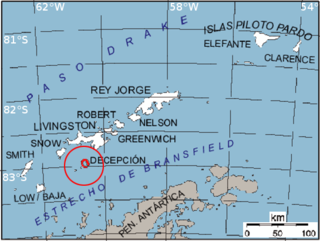Related Research Articles

In marine geology, a guyot, also known as a tablemount, is an isolated underwater volcanic mountain (seamount) with a flat top more than 200 m (660 ft) below the surface of the sea. The diameters of these flat summits can exceed 10 km (6.2 mi). Guyots are most commonly found in the Pacific Ocean, but they have been identified in all the oceans except the Arctic Ocean.

A seamount is a large geologic landform that rises from the ocean floor that does not reach to the water's surface, and thus is not an island, islet or cliff-rock. Seamounts are typically formed from extinct volcanoes that rise abruptly and are usually found rising from the seafloor to 1,000–4,000 m (3,300–13,100 ft) in height. They are defined by oceanographers as independent features that rise to at least 1,000 m (3,281 ft) above the seafloor, characteristically of conical form. The peaks are often found hundreds to thousands of meters below the surface, and are therefore considered to be within the deep sea. During their evolution over geologic time, the largest seamounts may reach the sea surface where wave action erodes the summit to form a flat surface. After they have subsided and sunk below the sea surface such flat-top seamounts are called "guyots" or "tablemounts".

Bransfield Strait or Fleet Sea is a body of water about 100 kilometres (60 mi) wide extending for 300 miles (500 km) in a general northeast – southwest direction between the South Shetland Islands and the Antarctic Peninsula.

The Juan de Fuca Ridge is a mid-ocean spreading center and divergent plate boundary located off the coast of the Pacific Northwest region of North America. The ridge separates the Pacific Plate to the west and the Juan de Fuca Plate to the east. It runs generally northward, with a length of approximately 500 kilometres (310 mi). The ridge is a section of what remains from the larger Pacific-Farallon Ridge which used to be the primary spreading center of this region, driving the Farallon Plate underneath the North American Plate through the process of plate tectonics. Today, the Juan de Fuca Ridge pushes the Juan de Fuca Plate underneath the North American plate, forming the Cascadia Subduction Zone.

Psalm 130 is the 130th psalm of the Book of Psalms, one of the Penitential psalms. The first verse is a call to God in deep sorrow, from "out of the depths" or "out of the deep", as it is translated in the King James Version of the Bible and the Coverdale translation respectively. It is one of 15 psalms that begin with the words "A song of ascents". The Book of Psalms is in Ketuvim, the third section of the Hebrew Bible, and is a book of the Christian Old Testament. In the Greek Septuagint version of the Bible, and in the Latin Vulgate, this psalm is Psalm 129 in a slightly different numbering system. In Latin, it is known as De profundis.
Methanolobus profundi is a mesophilic, methylotrophic methanogen archaeon. The type strain is MobMT. It was isolated from a deep subsurface gas field.

De profundis is a choral composition by Arvo Pärt. He wrote the work in 1980, a setting of Psalm 130 in Latin for a four-part men's choir, percussion and organ. It was first performed at the Martinskirche, Kassel on 25 April 1981, conducted by Klaus Martin Ziegler. Pärt dedicated the work of around 7 minutes to Gottfried von Einem. It was published by Universal Edition. Pärt arranged it for chamber orchestra in 2008.
Microbacterium profundi is a Gram-positive, neutrophilic, aerobic and rod-shaped bacterium from the genus of Microbacterium which has been isolated from deep-sea sediments from the Pacific Ocean.
Serinicoccus profundi is a Gram-positive bacterium species from the genus of Serinicoccus which has been isolated from deep-sea sediments from the Indian Ocean.
Thalassotalea profundi is a Gram-negative, rod-shaped and motile bacterium from the genus of Thalassotalea which has been isolated from a scleractinian coral from the Yap seamounts from the Pacific Ocean.
Rheinheimera marina is a Gram-negative, rod-shaped, aerobic and motile bacterium from the genus of Rheinheimera which has been isolated from a seamount in the near of Yap Trench from the western Pacific.
Virgibacillus indicus is a Gram-variable, endospore-forming, moderately halophilic and motile bacterium from the genus of Virgibacillus which has been isolated from sediments from the Indian Ocean.
Virgibacillus profundi is a Gram-variable, moderately halophilic, endospore-forming and motile bacterium from the genus of Virgibacillus.
Glycocaulis profundi is a Gram-negative, strictly aerobic and rod-shaped bacterium from the genus of Glycocaulis which has been isolated from seawater from a depth of 4000 meter from the Mariana Trench.
Ponticaulis profundi is a Gram-negative, strictly aerobic, rod-shaped and motile bacterium from the genus of Ponticaulis which has been isolated from a seamount near the Yap Trench.
Lutibacter profundi is a Gram-negative, rod-shaped and non-motile bacterium from the genus of Lutibacter which has been isolated from the Loki's Castle hydrothermal system from the Arctic Mid-Ocean Ridge.
Myroides profundi is a Gram-negative, aerobic and non-motile bacterium from the genus of Myroides which has been isolated from deep-sea sediments from the southern Okinawa Trough.
Georhizobium profundi is a species of Gram-negative bacteria.
Pelagihabitans is a Gram-negative, strictly aerobic, rod-shaped, non-spore-forming and non-motile genus of bacteria from the family of Flavobacteriaceae with one known species. Pelagihabitans pacificus has been isolated from a deep-sea seamount.
Algibacter pacificus is a Gram-negative, rod-shaped and facultative anaerobic bacterium from the genus of Algibacter which has been isolated from the Caroline Seamounts from the Pacific Ocean.
References
- 1 2 "Species: Mesoflavibacter profundi". LPSN.DSMZ.de.
- 1 2 Wang, Dan-Yang; Wang, Qian; Liu, Jie; Zhang, De-Chao (September 2018). "Mesoflavibacter profundi sp. nov. Isolated from a Deep-Sea Seamount". Current Microbiology. 75 (9): 1142–1146. doi:10.1007/s00284-018-1500-6. PMID 29696370. S2CID 13810658.
- ↑ "Mesoflavibacter profundi". www.uniprot.org.